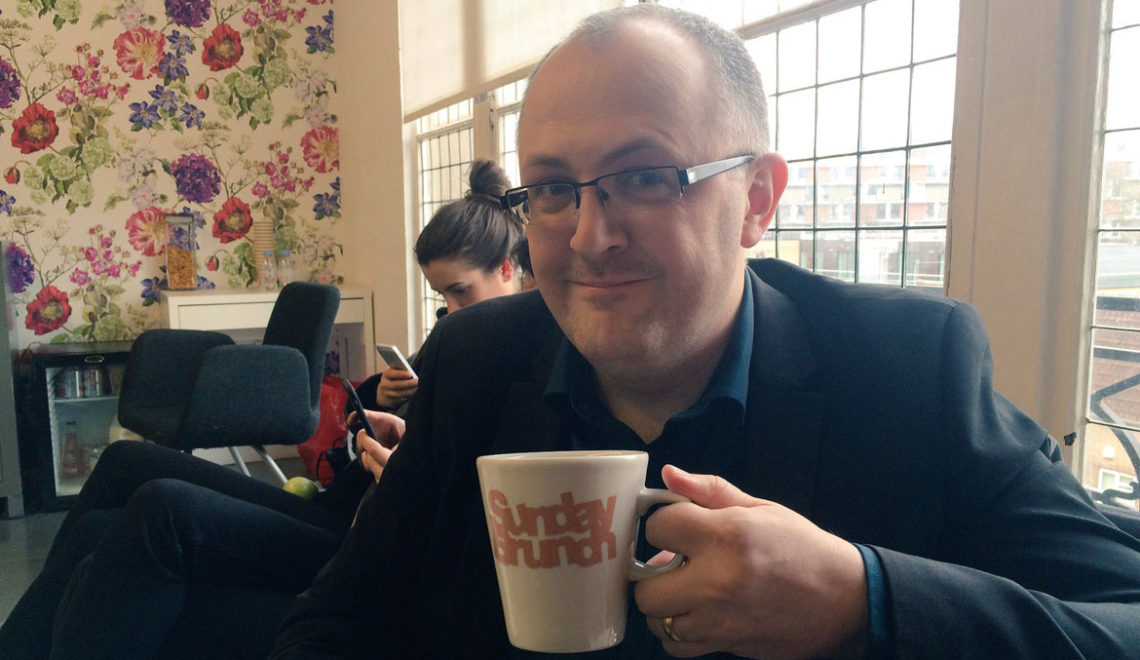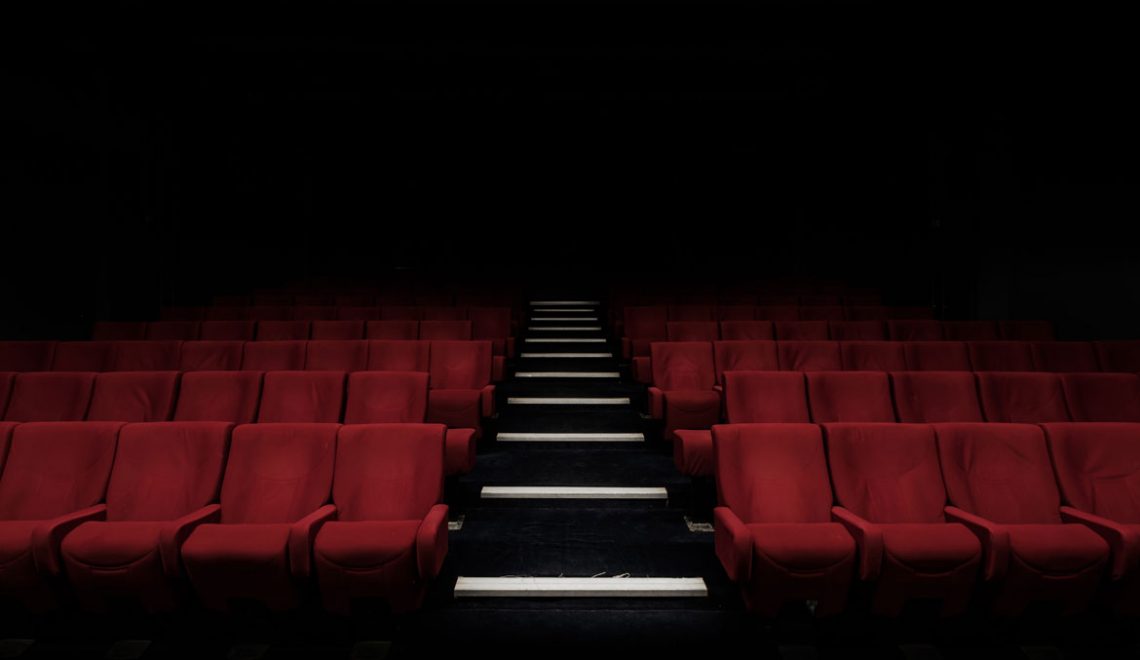
Dean Burnett is a tutor lecturer within the Division of Psychological Medicine and Clinical Neurosciences at Cardiff University. In addition to that, he is a comedy writer and stand-up comedian. Furthermore, he is a frequent contributor to the Guardian, where he mainly writes about neuroscience, psychiatry, the media and stand-up comedy. In this interview, we have touched on a wide range of topics from his love of Star Trek, to his favourite books, spoiler alert – one of them is The Tale Of The Duelling Neurosurgeons by Sam Kean. It has been a pleasure to chat with Dean and we hope you enjoy reading his very funny interview.
Introduction
Q: What is your dinner party monologue for when someone says “and what do you do?”
A: Tricky to answer, this one, as I’ve got many answers I can give to this, I’ve tried most of them at some time or other and the reaction is invariably questionable. I say “I’m a neuroscientist” and people seem compelled to make a feeble joke, usually some variation of “you can practice on my brain if you like!”, which is annoying because a) I can’t, that’s not allowed, and b) even if it was, I get the distinct impression they don’t mean it.
I say “I work in psychiatry”, which is true, as I’m a tutor lecturer for a psychiatry degree programme, and people invariably become very defensive, saying “you better not diagnose me!” with a forced grin to imply it’s a joke but it’s obvious that it’s a real concern. I’m not actually a psychiatrist so I couldn’t do that anyway, but even if I could, why would I want to. That’s not how it works at all. It’s like someone telling you they’re a plumber and you saying “You better leave my toilet alone!” Saying “psychology” instead of “psychiatry” gets pretty much the same response.
I say I do comedy, which is mostly accurate, and, as any comedian will tell you, the response is pretty much always “Ooh, go on then, tell us a joke!”, which is like someone telling you they’re an accountant and you saying “Ooh, go on then, do my taxes!”
I can now technically say “I’m an author” but I don’t because I feel it sounds pretentious and so many people I’ve met are also aspiring writers and typically want to know how I got published, and get very unsubtle about the fact that I should read their book and recommend it to my agent and all my contacts. Either this, or, when they find out I never planned to be an author and largely ended up being one accidentally, they’ll immediately try to disembowel me with a butter knife. Assuming this is a dinner party.
I mostly say I do “all sorts” or “You know, stuff” when asked, and provide more detail as and when asked for it. At least that way it’s not my responsibility, however awkward it ends up getting.
Early Life
Q: Could you tell us about where you grew up; were you a rural or city dweller?
A: Rural. Very rural. A very small ex-mining village in the South Wales valleys. There was a no-through-road, just a dead end up the top of the valley, so people seldom came up there. Very nice area to grow up in for things like trees, fresh air, wholesome fun, close communities, everything within walking distance and all that. But the economic decline and lack of prospects for the area really started to bite as I grew up, so it could seem suffocating and the wider world was quite daunting. So, a mixed blessing really.
Q: What subject(s) did you excel at in school, and which did you find most challenging?
A: Surprisingly, or perhaps not, I was always very adept at English and creative writing when I was very young. Science was something I was dimly aware of but saw no appeal in it. Then I got into Star Trek and other sci-fi and that seemed to switch my priorities, and I only returned to my writing interests after I’d finished my first degree. On the other hand, languages and music are something I’ve always struggled with. Not sure why, I suspect those aspects of my brain weren’t stimulated enough early on so are somewhat stunted.
Q: Can you recall any reoccurring comments from your school reports?
A: “Dean is a keen pupil but needs to set realistic boundaries, he’s not as capable as he thinks he is”. This was mentioned a few times. The Burnett’s have a stubborn rebellious streak, and I guess I have that too, but this flipped it somewhat and gave me a “screw you, I AM going to be a scientist!” attitude. It’s only just this second occurred to me that this may have been their plan all along. Touché, teachers.
Q: Did you ever have a eureka moment where you thought, “this is the subject I want to study”?
A: I did, ironically, find neurology and neuroscience really tricky when I first encountered it at A-level. I couldn’t quite grasp how 2 positively charged ions (potassium and sodium) could create different voltages across a cell membrane. Then I ‘got it’, and it was like “Oh. Oohhh. OOOOOOOOHHHHHHHH!” and that sort of gave me a positive association with the subject that, on the evidence, has lingered somewhat.
Q: Can you remember the point at which you fell in love with your subject?
A: I did visit a few universities with a view to studying a range of subjects (Neuroscience, medicine, genetics, physiotherapy etc.) but when we came to Cardiff the professor giving us the guided tour took us through a teaching lab, got a bucket, pulled the lid off and without warning said “Here we have a human brain”. It was just sat there, in a bucket. Most of the group recoiled, but I was “Yes, this is where I belong”. Couldn’t tell you why probably a combination of neuroscience enthusiasm and a sense of showmanship.
Academic Education
Regarding your undergraduate studies:
Q: Which University did you study at, and was it your first choice?
A: Cardiff University, and yes.
Q: What undergraduate degree did you study for at University, and in hindsight would you select the same subject again?
A: Neuroscience, and yes, definitely. Can’t exactly argue that it’s not done me good in the long run.
Q: Can you remember a University lecturer who really inspired you?
A: Doctor, now professor, Mark Good, had a brilliant way of explaining complex neurological subjects like memory formation (his subject) in a way that was accessible and even amusing with numerous jokes thrown in, most of which were quite cheesy, but in a charming sort of way. I guess you could say he’s had the biggest impact on my career overall, especially since he was later my PhD supervisor.
Regarding your postgraduate studies:
Q: What motivated you to further pursue academia?
A: A combination of things. Firstly, I’m the first member of my family to get to University at all, so I did sort of feel like I was representing them all in some way, and felt I should go as far as I could with it. This isn’t to say I didn’t want to do a PhD for my own sake, I did, I just had added motivation. However, I was wary that I was kidding myself that I wanted to do a PhD just to avoid getting an actual job, so I didn’t go directly from undergraduate to postgraduate study. After my undergraduate degree, worked as an anatomy technician for the Cardiff medical school. Basically, I helped embalm and dissect human corpses. After doing that for nearly 2 years, my enthusiasm to get back into academia was stronger than ever, which I think is self-explanatory.
Q: What institution(s) did you study at in your pursuit of postgraduate education?
A: Cardiff University again. My background in a very small tight-knit community probably means I have a much greater tolerance and willingness to ‘stick with what I know’ rather than seeking out new experiences somewhere different, broadening my horizons etc. I grew up in a valley, I like my horizons a few miles apart at most.
Q: What was the title of your PhD thesis, and how would you explain your findings to a novice?
A: “The role of the hippocampus in configural learning”. Basically, we know that the hippocampus is crucial for forming, ‘encoding’, new memories. At the most fundamental level, memories are made of individual elements, all the little things that make up an experience (colours, specific shapes, certain sounds etc.) There is debate in the field of associative learning and memory as to whether our memories for complex events utilise existing memories for the individual elements, like a story relying on the existing letters of the alphabet, or whether the combination of elements creates a whole new memory that exists somewhat independently. My research provided evidence that the hippocampus does indeed seem to create whole new memories, but is also involved in retrieval of these memories, not just the formation and encoding of them.
Q: If you had your time as a student again, what would you do, if anything, differently?
A: The downside of my background is that I was coming at a PhD without any real appreciation for how academia and research really worked. I didn’t know you were supposed to apply for conferences, that you were meant to volunteer to do talks and posters, that you needed publications, I thought this would, like in an undergraduate degree, be explained to you as you went along. It’s not so much that I couldn’t be bothered to find the relevant information, it’s that I didn’t even know I had to do that. I figured it all out eventually of course, but this took time, time my peers were spending doing proper research and improving their prospects, because they seemed to know how the whole thing worked.
It has left me with an element of class resentment, I will admit. If I could do my time again, I’d try to address this deficit ahead of time, rather than later when I’d lost a lot of ground and was, seemingly, destined for an unremarkable neuroscience career. But, saying that, if that hadn’t happened I may well have not pursued ‘alternative’ avenues and ended up where I am now, which is somewhere I’m incredibly happy with, I won’t deny. It’s a tricky one.
Research Focus
Q: Tell us about your current research focus?
A: I’m currently a tutor/lecturer/author/science writer, so I don’t actually have any original research I’m conducting myself. I was always much better at talking about brains than doing the dirty work of investigating them.
Q: Within your area of study, what breakthroughs are on the horizon?
A: If we’re talking neuroscience in general, there are so many possibilities here. I think the augmenting of technology with neurology is going to keep pressing ahead, with people being hooked up to robotic limbs and similar to help them regain mobility and function, or even improve it? This should lead to greater understanding of the connections between neurons and nerves, which may help treat paralysis, or even things like dementia and similar disorders, which are going to be an increasingly urgent problem.
Q: Let your imagination take over for a minute and tell us what you hope your successors will be researching in 2116?
A: I expect they will be largely occupied with investigating the specific properties of the cuttlefish brain and nervous system, as part of our ongoing war with the cephalopods.
Q: What do you feel your professional legacy will be?
A: If I can be the guy who stopped a decent number of people being mystified by or afraid of the complexity of their own brains, I’ll be happy with that.
Current Projects
Q: Are you working on any extra-curricular projects at the moment, such as: books, podcasts, websites, or speaking?
A: Here’s the thing; yes I am, very much so. But they’ve not been officially announced yet, so I can’t tell you. I’m not going to do the whole “I could tell you, but then I’d have to kill you” thing because that’s tedious and not true. I wouldn’t kill you. Someone else would have that arranged, not me.
Advice and Tips
Q: If you could give your 18-year-old self one piece of advice, what would it be?
A: “Late-night Doner kebabs are as bad as you think they are, there’s no need to test this assumption.” Anything more than that and I’d be afraid of disrupting the timeline (Star Trek fan, remember).
As long as you’re dedicated, enthusiastic and willing to put the work in, you belong here.
Q: What advice would you give someone looking to start, or progress his or her career in your field?
A: As long as you’re dedicated, enthusiastic and willing to put the work in, you belong here. Don’t let anyone or anything suggest otherwise, that’s just their prejudices and assumptions at work, not the reality.
Q: Which book would you say has had the biggest impact on your life?
A: It’s either Brain Story by Susan Greenfield of all people (long story), which first showed me that brains could be understandable, or Hitchhikers Guide To The Galaxy, which showed me that science (sort of) and humour didn’t have to be meticulously separated. This has informed much of my worldview since.
Q: If you could recommend one book to a novice in your field, what would it be?
A: My own book The Idiot Brain, obviously. It’s written with such people in mind. But if self-promotion is frowned upon (it is by me) then Sam Keane’s The Tale Of The Duelling Neurosurgeons, a very entertaining exploration of the (often messy and ridiculous) history of the study of the brain.
Q: Why do you think being a freethinker is important?
A: It depends. Generally, yes, but not if you’re something like a heart surgeon. You don’t want people like that getting creative and ‘thinking outside the box’. Stick to the script, guys.
Conclusion
Q: And finally, we are back at the dinner party. Someone offers you a drink, what do you ask for?
A: Are they one of the people who’s been haranguing me about getting their book published? If so, whichever drink is furthest away and takes the longest time to get, so I can make my escape via the bathroom window. Failing that, a glass of wine is fine. Red, preferably, but I’m not fussy.
If you’d like to find out more about Dr Dean Burnett you can check out his academic profile, Twitter page and personal website.
Advertisement









